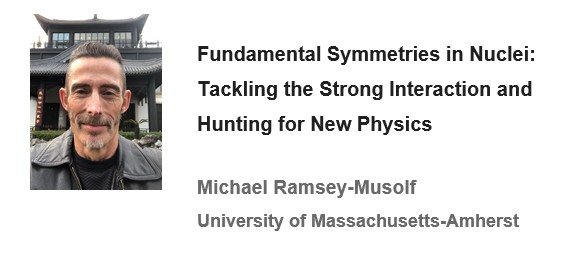

Wednesday, March 29, 2023
3:30-4 p.m. for refreshments - 4-5 p.m. for presentation
CEBAF Center Auditorium
Abstract: Nuclei and hadrons are “laboratories” for exploring nature’s fundamental interactions. In this talk, I will discuss the theoretical challenges and advances in the interpretation of experimental tests of fundamental symmetries performed with these strongly interacting systems.
This theoretical work has enabled us to exploit such tests to achieve a deeper understanding of the dynamics of Quantum Chromodynamics in the non-perturbative regime and to gain a powerful new tool in the hunt for possible physics beyond the Standard Model.
Biography: Michael J. Ramsey-Musolf is a T.D. Lee Chair Professor at the T.D. Lee Institute/Shanghai Jiao Tong University and a Professor Physics at the University of Massachusetts-Amherst as well as the Director of the Amherst Center for Fundamental Interactions. He received his B.A. in physics and mathematics from Pomona College in 1984 and earned his Ph.D. at Princeton University in 1989 under the supervision of Sam B. Treiman (Princeton), Wick C. Haxton (University of Washington), and Barry R. Holstein (University of Massachusetts). He received a Master of Divinity at the Episcopal Divinity School in 1993. His post-Ph.D. career took him from a post-doc at MIT to faculty positions at Old Dominion University/Jefferson Lab, the Institute for Nuclear Theory/University of Washington, University of Connecticut, Caltech, and University of Wisconsin before beginning appointments at University of Massachusetts-Amherst and the T.D. Lee Institute/Shanghai Jiao Tong University.
Ramsey-Musolf is the recipient of the 2023 Herman Feshbach Prize in Theoretical Nuclear Physics. He was awarded the Division of Nuclear Physics Dissertation Award in 1990 and an NSF Young Investigator Award in 1993. He became an APS Fellow in 2001.
His work has contributed to several research directions in nuclear physics, particle physics, and cosmology: electroweak radiative corrections, tests of fundamental symmetries and neutrino properties, electroweak baryogenesis, extended Higgs sector implications for cosmology and collider physics, finite temperature and nonequilibrium quantum field theory, and the development of effective field theory for fundamental symmetries and its application to nucleon structure. Thus far, he has mentored over 60 Ph.D. students and post-docs and has also been a visible advocate for the full inclusion of sexual and gender minorities in physics. He is also an Episcopal priest, having been ordained at Christ & St. Luke’s Church in Norfolk in 1994.
For questions about the Jefferson Lab Colloquia series, contact Jae Cho.

